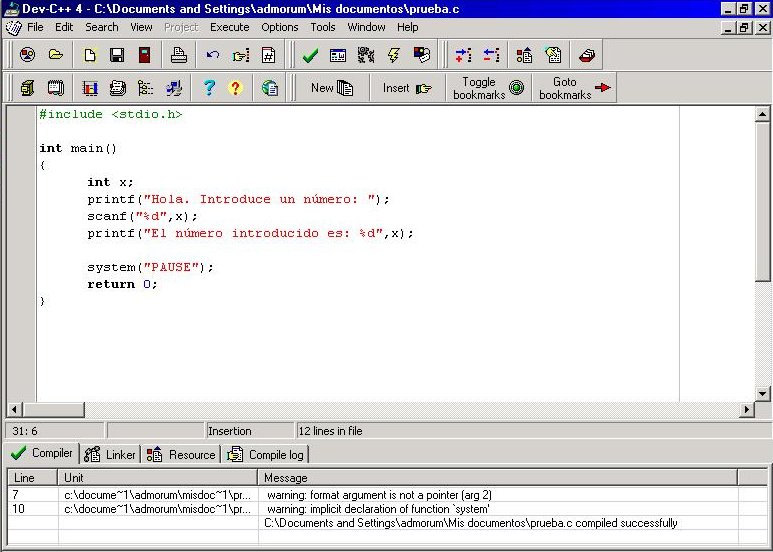Dev C++ Compiler Options

Go to Tools - Compiler Options - 'Compiler' tab. Check the checkbox labeled, 'Add the following commands when calling the compiler' And add in the text entry box, '-std=c11' or if that doesn't work '-std=C0x'Should be something like that anyway, I haven't had Dev C installed for many years, so I had to look at some screenshots on Google to remember. The Dev C package works great right “out of the box” for compiling programs for the windows archeture, but with a little work it can be configured to work with the wide range of cross-compilers the GNU tool chain offers. Preliminary Steps and Notes The first step to getting the Dev C to work is to setup the compiler environment; this.
Dev C Compiler Options For Mac
- Choose Options = Compiler Options from the toolbar. The following dialog box appears (Figure 2): Figure 2. Click on the Linker tab on the top and uncheck all the boxes. Most importantly make sure that the Compile for Win32 (no console) box is unchecked. Click on the Options = Environment Options on the Menu bar.
- Go to Tools Option in your Dev-C IDE and then Go to Compiler Option(Tools-Compiler Options) After that there is a option on Compiler Tab:- Compiler set to configure There you can Choose TDM-GCC 4.7.1 64-bit for 64 bits computers and TDM-GCC 4.7.1 32-bit for 32 bits computers and press OK.
- How to use Dev-C Introduction Dev-C is a full-featured integrated development environment (IDE), which is able to create Windows or DOS-based C/C programs using the Mingw compiler system (included with the package), or the Cygwin compiler. These are the recommended requirements of Dev-C: Microsoft Windows 98, NT or 2000 32 MB RAM.
- As for setting compiler options, you typically have to navigate the 'Build Configuration' or 'Project Properties' or similar panels. Usually, you will find a place to put 'custom compiler options' where you can place the exact command-line compiler option (like -std=c11), that is, if you can't find a checkbox for the particular option you need.
- Go to Tools Option in your Dev-C IDE and then Go to Compiler Option(Tools-Compiler Options) After that there is a option on Compiler Tab:- Compiler set to configure There you can Choose TDM-GCC 4.7.1 64-bit for 64 bits computers and TDM-GCC 4.7.1 32.
The -define option defines name as a symbol in all source code files your program.
Syntax
Arguments
name, name2
The name of one or more symbols that you want to define.
All DISCOVERY SERIES instruments come alive on a KOMPLETE KONTROL S-Series keyboard. Find the right sound quickly, tweak it to perfection, and see the instrument mapped out clearly in lights across the keys – key zones, keyswitches, scales, and more, all color-coded and ready to play. May 01, 2019 friends today i'm give you indian discovery kontakt library & also teach you how to download & install indian discovery kontakt library in fl stdio 2. Skip navigation. Free vst plugin dune 2. Discovery Pro is 12 oscillators Virtual Analog VSTi Synthesizer featuring 4 layers, unison, WAV and SoundFont (SF2) support, PADSynth re-synthesis, 2X. Clavia's Nord Lead best friend. Discovery has been highly inspired by one of Clavia's synth masterpieces: the Nord Lead 2. Discovery can import Nord Lead 2 and Nord Lead 2X Sysex patches directly, and 99% of their MIDI CC are bound to the original Nord Lead knobs. Discovery Pro at a glance. Discovery Pro archives even higher quality and features than his small cousin Discovery, retaining all previous functionalities.We spent countless hours of hard coding, design and engineering, bringing the best discoDSP team work in the form of a new instrument. 
How To Use Dev C++ Compiler
Remarks

The -define option has the same effect as using a #define preprocessor directive except that the compiler option is in effect for all files in the project. A symbol remains defined in a source file until an #undef directive in the source file removes the definition. When you use the -define option, an #undef directive in one file has no effect on other source code files in the project.
You can use symbols created by this option with #if, #else, #elif, and #endif to compile source files conditionally.
-d is the short form of -define.
You can define multiple symbols with -define by using a semicolon or comma to separate symbol names. For example:
The C# compiler itself defines no symbols or macros that you can use in your source code; all symbol definitions must be user-defined.
Note
The C# #define does not allow a symbol to be given a value, as in languages such as C++. For example, #define cannot be used to create a macro or to define a constant. If you need to define a constant, use an enum variable. If you want to create a C++ style macro, consider alternatives such as generics. Since macros are notoriously error-prone, C# disallows their use but provides safer alternatives.
To set this compiler option in the Visual Studio development environment
Open the project's Properties page.
On the Build tab, type the symbol that is to be defined in the Conditional compilation symbols box. For example, if you are using the code example that follows, just type
xxinto the text box. Download cooking academy 1 apk.
For information on how to set this compiler option programmatically, see DefineConstants.